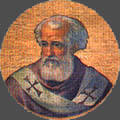 When Conrad of
Salzburg, a gallant fighter for reform, heard that John Coniulo had become Pope
Gelasius II, he cried out: "Among the cardinals a worse choice could not have
been made than John, but there may be some virtue in Gelasius." There was
indeed. Few suffered so much in so short a time for ecclesiastical liberty as
Gelasius II. John Coniulo was born of noble parents at Gaeta. He became a monk
at Monte Cassino, but Urban II brought him to Rome to serve as chancellor. Urban
wished to improve the style of papal documents, and it was for this that he
called on John. John did much to improve the style of papal documents. He served
Urban and Paschal loyally. Indeed, it was his unswerving loyalty to Paschal II
in his time of trial that had aroused the suspicions of the more extreme
reformers. When Paschal died, Rome was torn between papal and imperial factions.
The cardinals managed to meet in a monastery, and there they elected John of
Coniulo. He accepted and was called Gelasius II.
When Conrad of
Salzburg, a gallant fighter for reform, heard that John Coniulo had become Pope
Gelasius II, he cried out: "Among the cardinals a worse choice could not have
been made than John, but there may be some virtue in Gelasius." There was
indeed. Few suffered so much in so short a time for ecclesiastical liberty as
Gelasius II. John Coniulo was born of noble parents at Gaeta. He became a monk
at Monte Cassino, but Urban II brought him to Rome to serve as chancellor. Urban
wished to improve the style of papal documents, and it was for this that he
called on John. John did much to improve the style of papal documents. He served
Urban and Paschal loyally. Indeed, it was his unswerving loyalty to Paschal II
in his time of trial that had aroused the suspicions of the more extreme
reformers. When Paschal died, Rome was torn between papal and imperial factions.
The cardinals managed to meet in a monastery, and there they elected John of
Coniulo. He accepted and was called Gelasius II.
His initiation into the papacy was rude. A nobleman named Cencius Frangipane
broke into the monastery, grabbed Gelasius by the throat, threw him to the
ground and actually kicked the old man with his spurred feet. Then he dragged
him off by the hair and threw him into a dungeon. The Romans, infuriated, went
right after the ruffian and soon secured the Pope's release. This brutal act was
seemingly a sideshow to the main struggle with Henry V over lay investiture.
Henry, as soon as he learned of the election, hurried to Rome to put pressure on
the new pope. Gelasius quickly showed his mettle. He fled and took a ship down
river to Porto. The Germans chased the Pope and fired arrows at his ship. Unable
to get to sea because of a furious storm, the old Pope left his galley and made
his painful way to the castle of Ardea thirty miles distant. There followed a
grim game of hide and seek as the Germans scoured the countryside, but Gelasius
gave his pursuers the slip, got back safely on his ship and sailed away to Gaeta.
There he was ordained priest on March 9, and bishop the next day. When Henry set
up Maurice, archbishop of Braga, as antipope, Gelasius excommunicated Henry and
his "idol." The Normans helped Gelasius get back to Rome but could not clear the
city of the antipope's forces. Gelasius was chanting vespers in the Church of
St. Praxed when the Frangipani burst in. The old Pope managed to get on a horse
and fly. He was found by his friends in a field outside the city. Disgusted with
Rome, he left for France. After consecrating the new cathedral at Pisa, he
reached France safely and there was treated royally. Gelasius worked hard, but
his health was shattered. When he realized that he was dying, he. asked to be
carried to the monastery of Cluny, and there in that wellspring of reform the
gallant Gelasius II died on January 29, 1119.
Excerpted from "Popes
Through the Ages" by Joseph Brusher, S.J.

